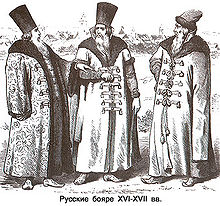boyar
English
Alternative forms
Etymology

From (deprecated template usage) [etyl] Russian боя́ре (bojáre), plural of боя́рин (bojárin).
Pronunciation
- Lua error in Module:parameters at line 290: Parameter 1 should be a valid language or etymology language code; the value "UK" is not valid. See WT:LOL and WT:LOL/E. IPA(key): /ˈbɔɪɑː/, /ˈbəʊjɑː/, /bəʊˈjɑː/
Noun
boyar (plural boyars)
- (historical) A member of a rank of aristocracy (second only to princes) in Russia, Ukraine, Belarus, Bulgaria, Macedonia, Serbia and Romania.
- 1997, John Julius Norwich, A Short History of Byzantium, Penguin 1998, p. 159:
- Boris had abdicated in 889, leaving the throne to his son Vladimir, who had immediately identified himself with the boyar aristocracy which Boris had done his utmost to crush.
- 2007, John Darwin, After Tamerlane, Penguin 2008, p. 68:
- A long series of wars was fought in the sixteenth century to keep Polish influence at bay in the West Russian lands, and prevent it from seducing Muscovy's restless boyars, the warrior-barons whose independence the grand dukes were determined to crush.
- 2009, Diarmaid MacCulloch, A History of Christianity, Penguin 2010, p. 514:
- some of his family looked to Orthodox Christianity to sustain them, and not only many of his boyars but most of his subjects were Orthodox Christians.
- 1997, John Julius Norwich, A Short History of Byzantium, Penguin 1998, p. 159:
Synonyms
Translations
rank of aristocracy
|
Anagrams
Spanish
Etymology
Verb
Lua error in Module:es-headword at line 49: Parameter 2 is not used by this template.
- (intransitive) to float
Conjugation
Further reading
- “boyar”, in Diccionario de la lengua española, Vigésima tercera edición, Real Academia Española, 2014
